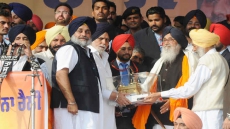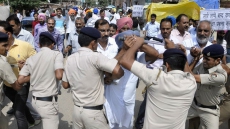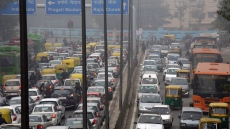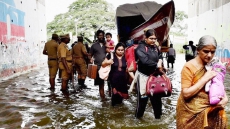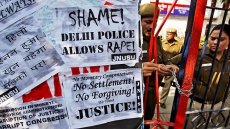The odd-even restrictions for cars being experimented with in New Delhi will not work to improve the national capital's air quality due to its geographical location and the long-range airmass floating in from north and northwestern India, says an Indian origin US professor who has been analyzing satellite data.
The odd/even restriction will be of great help in reducing the traffic but wouldn't do much to reduce concentrations of fine particles, Ramesh Singh, a professor at Chapman University in California, told IANS in an e-mail interview during an extended visit to Varanasi, from where he obtained his B.Sc., M.Sc. and PhD degrees.
"My views are supported by data from NASA's Moderate Resolution Imaging Spectroradiometer (MODIS) satellite," said Singh, who was formerly a professor of civil engineering at the Indian Institute of Technology-Kanpur.
According to Singh, Aerosol Optical Depth, which is a measure of air pollution, retrieved from MODIS satellite data over Delhi during December 1, 2015, to January 10, 2016, shows that the pollution level remains high and there is no reduction in PM2.5 fine particles after the odd-even restrictions were put in place.
Singh said that Delhi Chief Minister Arvind Kejriwal has tried to copy from Beijing, where some car owners in different areas are allowed to drive only on specific days "to cut down the flow of traffic, not because of pollution".
"Delhi and Beijing have similar sources of pollutants (coal-based power plants, brick kilns, industry and the like), but we should not compare whether PM2.5 is higher in Delhi or Beijing because the geographical situation is different," Singh said.
"Cities in the Ganges basin have the lofty Himalayas in the background and, again, whereas in Beijing the emissions get dispersed in all directions, in Delhi pollutants come from western parts and occasionally from eastern parts of the basin.
"Delhi is located in the Ganga basin and during winter time, depending upon the weather conditions, dense haze, fog and smog are formed and moves in the Ganga basin. Therefore, sometimes dense fog/haze/smog is seen in Delhi, Kanpur, Lucknow, Banaras and Amritsar.
"Also, during the winter season the wind, which is mainly westerly, brings pollutants from Pakistan, and from Punjab and Haryana, northern regions of India. All these pollutants cannot be stopped due to the towering Himalaya in the north," Singh said.
Therefore, there is continuous flow of airmass from west to east and Delhi gets affected through the long range transport of pollutants from the west and also from the foothills of the Himalayas where the burning of wood is prevalent during the winter season, Singh said.
Emissions from vehicles in Delhi mix with the fine particles in the airmass coming from the western side and the strong mixing of the two affects the solar radiation budget and highly impacts Delhi's atmospheric chemistry, which may create other atmospheric problems, Singh said.
"While the effort of the Delhi government must be welcomed, a detailed feasibility study is needed to manage plying of vehicles in Delhi to curb the local pollution," he added.
